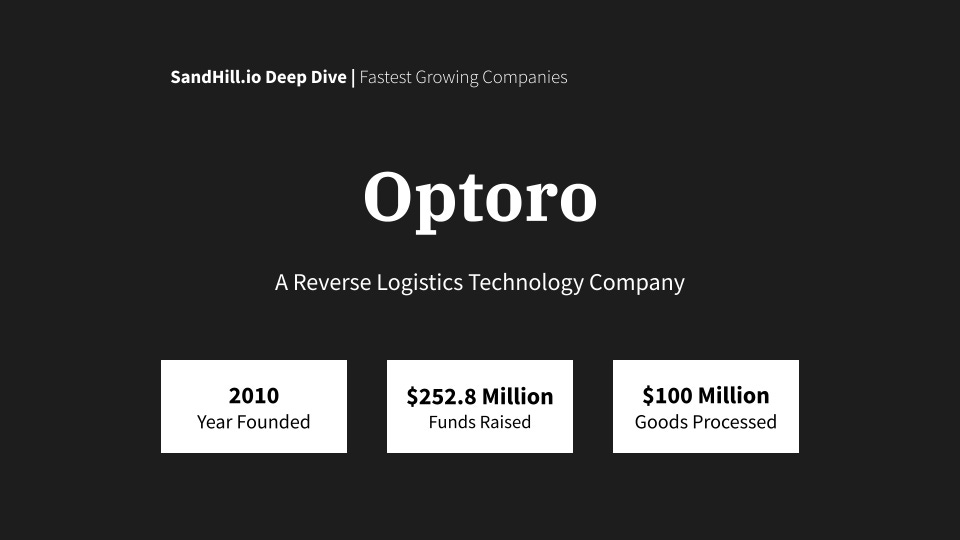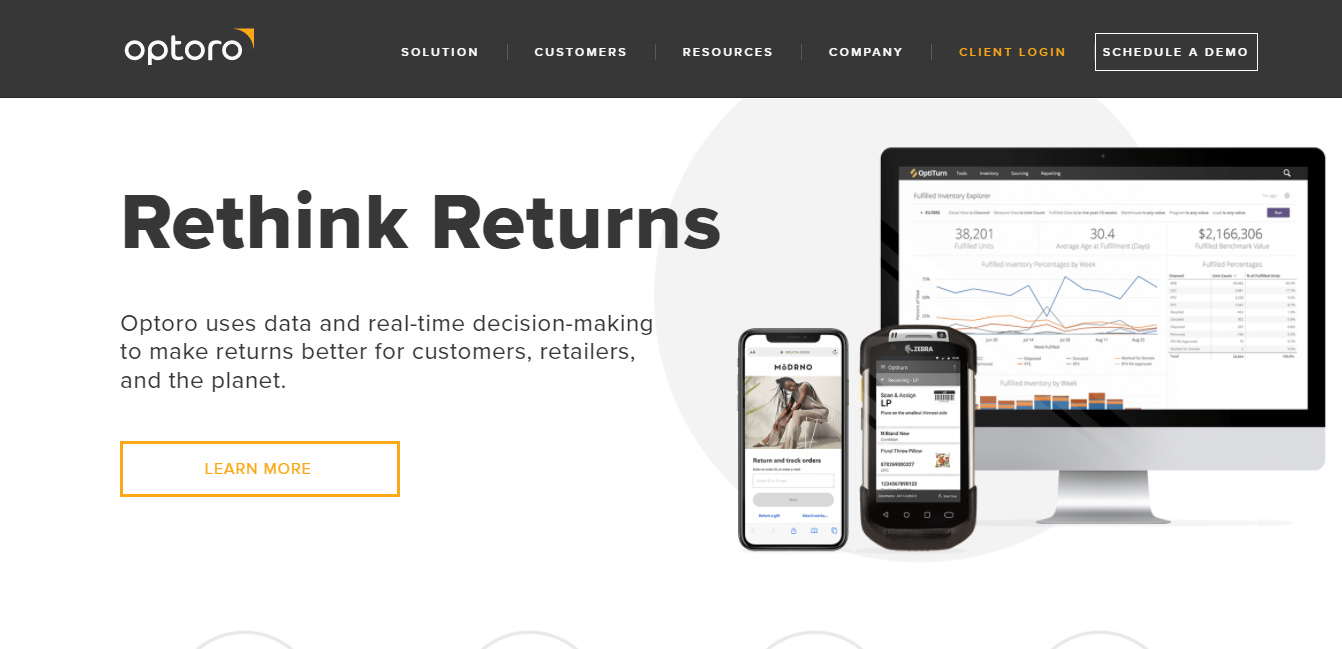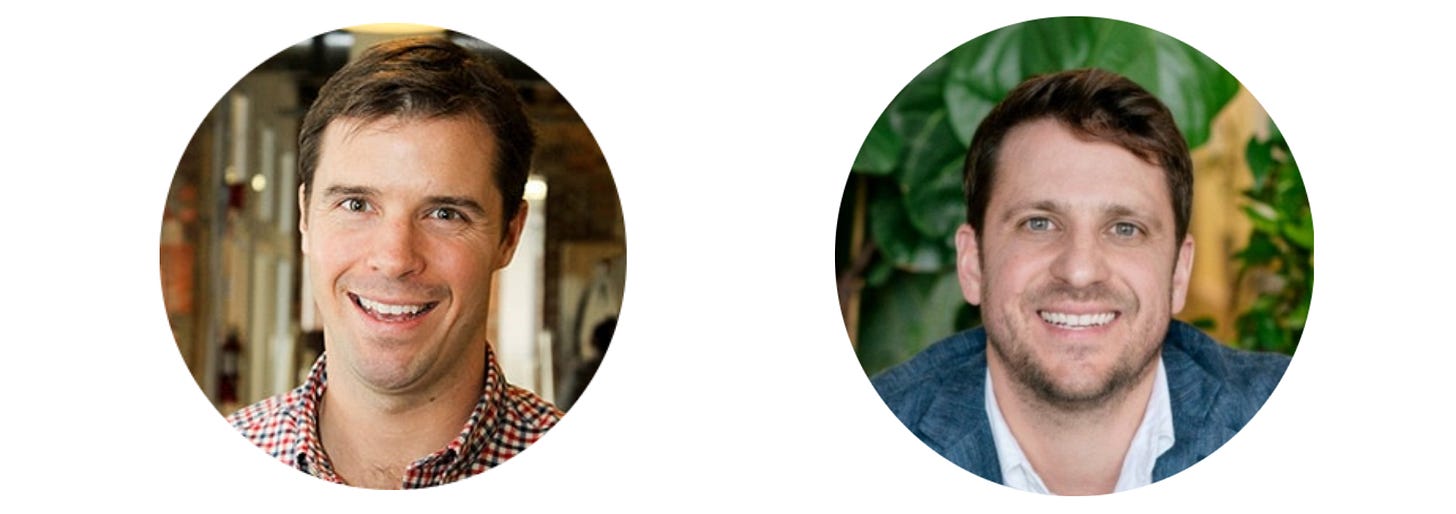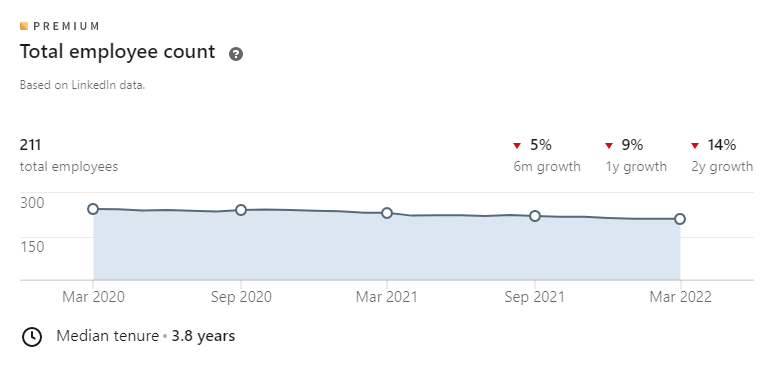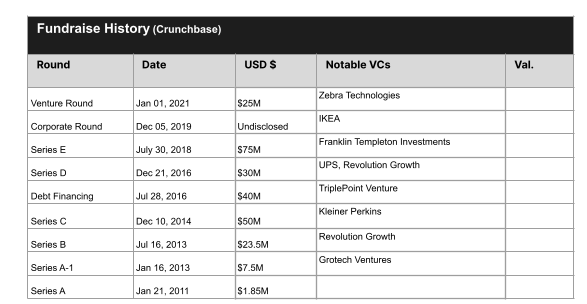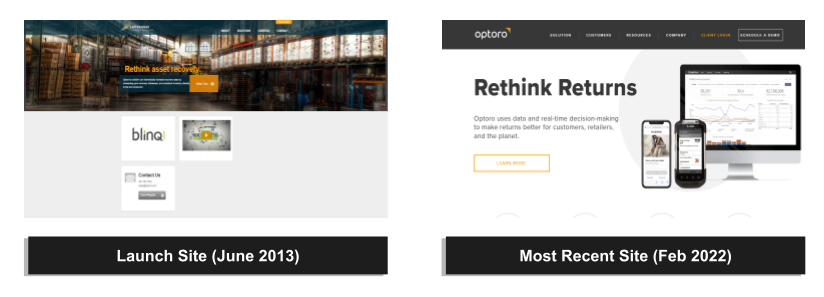Optoro - Reverse Logistics Company
Founded in 2010, Optoro is a reverse logistics technology company.
These briefs are produced by leveraging publicly available data sources and information. If you notice a mistake or see an area for improvement, please let us know through this typeform or via email (team@sandhill.io).
Snapshot
Founded in 2010, Washington DC-headquartered Optoro is a reverse logistics technology company. It works with retailers and manufacturers to process, manage and then resell their returned and excess inventory. Its software platform enables customers to get great deals, reduces environmental waste, and maximizes recovery value.
Optoro has been named one of the fastest-growing companies in the US. It has raised $252.8M from investors such as Revolution, UPS, Generation Investment Management, and Kleiner Perkins Caufield & Byers. With a client list of top national brands like IKEA, Target, Home Depot, Best Buy, Staples, American Eagle, Groupon, Bed Bath & Beyond, a growing team of 200+ employees, and a recent $25M Venture Fund in 2021, Optoro is gradually making its way to the top.
Business Overview & Products
Optoro’s main offering is a SaaS called OptiTurn. It is used in retailers’ warehouses to process, sort, and resell inventory that is in excess or has been returned by clients. The software keeps track of inventory from the warehouse till it reaches customers. Products can be marked as new, open box, refurbished, or used as per their condition. This information is analyzed by OptiTurn along with other data points to make sure that these items are diverted to the channel that will get retailers most of their money back.
The products are listed on online marketplaces under the brand name BLINQ. Products that are expected to net a higher recovery in bulk selling are resold on BULQ.com under the brand name of BULQ.
How It Works
Returns Management Solution streamlines return processing and create operational efficiencies across the supply chain. Starting at receiving, the technology collects meaningful data that allows for smart returns routing and channel decisions. It also includes intuitive desktop tools designed for adaptability and seamless operations. Retailers can automate and accelerate vendor returns with SmartRTV & Vendor Management to remove RTV cost and complexity. In addition, the holistic platform enables business agility with data-driven decisions, real-time insights, and unit-level visibility across the returns lifecycle.
Recommerce Solution maximizes recovery on returns, drives higher profits, and improves sustainability. It sells returned inventory through retailers’ own primary and secondary channels or on Optoro's proprietary B2B marketplace, BULQ, which is a one-stop-shop for retailers to utilize excess and returned inventory by putting them in the hands of retailers. BULQ appeals to resellers who are willing to pay a premium and move inventory at a fast pace, expanding their reach to more than 20 secondary marketplaces. Recommerce also ensures circularity by making sure that the leftover inventory ends up with happy customers or at charities instead of landfills.
Returns Experience Solution helps improve customer experience and loyalty during the returns cycle. For starters, to make the process seamless for first-time customers, they offer a Returns Portal for self-service returns initiation which also includes digital experiences like one-click exchanges. Moreover, to decrease refunds and drive repurchases, in case of a return, Instant Credit delivers customers the right product even before they return the wrong one. When it comes to delivery, Express Returns offers convenient drop-offs by not just providing convenience and speed but also offering label-free and box-free returns at numerous store locations throughout the country.
Optoro has access to a huge inventory of returned/unsold products because it handles reverse logistics. Each return that Optoro processes are entered into its ‘re-commerce’ system, which evaluates the item's condition and assesses value based on current market prices. Optoro then assigns a condition – Brand New, Like New/Open Box, Factory Refurbished, Used-Very Good – that is indicated on the item for resale so customers know exactly what they are getting. The item is then sent back to the retailer, manufacturer, or Optoro’s retail arm BLINQ to "recover the most value." where new or like-new items are sold at deep discounts.
Business Model & Pricing
Optoro has a B2B business model that helps both offline and online retailers sell returned or excess inventory more easily. Optoro has several channels for collecting revenue. For starters, customers who use the software are liable to pay a monthly licensing fee. Moreover, when the company sells goods on Blinq and Bulq, it takes between 15-50% of the amount it recovers for its clients, which ranges from $20 cents to $70 cents on the retailers’ part.
Traction
Optoro’s revenue was last estimated by Forbes in 2017 at more than $50M. With a growing staff of 220 in its Washington, DC headquarters, and its contract deal with more than 100 workers in its rented Tennessee warehouse, Optoro’s overhead is substantial. In addition, the company spends its investment capital on growth.
In 2020, 13,400 resellers bought and resold inventory from BULQ.com due to their newfound partnership with eBay. Despite the coronavirus pandemic, the company processed more than $100M of goods a month through its platform with the number growing at a quick pace. From its partnership with Staples and eBay, Optoro was able to divert 3.2M lbs from landfills. The company also sent over $3M of goods to charities in need by partnering up with IKEA. The technology used helped retail clients keep 96% of returned and excess inventory out of landfills. It also prevented 4.68M lbs carbon emissions by reducing transportation and increasing efficiency in the reverse supply chain. Optoro has access to more than $500M customers and their app has over 100k downloads.
Founder(s)
Tobin Moore (LinkedIn): CEO and Co-Founder at Optoro. Tobin, a graduate of Brown University previously co-founded eSpot, Optoro’s predecessor. He was also recognized as Ernst & Young Entrepreneur of the Year and was featured in Washington Business Journal’s 40 under 40 list.
Adam Vitarello (LinkedIn): President and Co-Founder at Optoro. Adam, a Brown University graduate has previously worked as CTO and CEO at eSpot, Optoro’s predecessor. He also worked at Fojol Brother, a traveling culinary carnival.
History & Evolution
The origin of Optoro dates back to 2004 when Tobin Moore, a student of Brown University watched his father struggle to sell an item on eBay. At the time, eBay was the main e-commerce destination available online, but still tedious and difficult to use. As a first-time user, with no buyer feedback, Tobin’s father could not find any buyers, and neither could he decide on a fair price per item. That is when it hit Tobin: there was an opportunity available to disrupt the used goods retail market.
So in 2004, Tobin started eSpot, Optoro's precursor out of his Brown University dorm room. The initial idea was to help sellers list used goods on eBay. eSpot would price items, take photos and write up a listing, in addition to managing the eBay auction for its clients. To help with operations, Tobin brought on board his childhood friend, Justin Lesher, who operated out of his dorm room at Penn.
After graduating, Tobin and Justin ran the business out of an attic above the garage and went without paychecks for two years. However, soon they opened a 1200 square foot eBay drop-off store in Georgetown and roped in another Brown graduate, Adam Vitarello to help run the business.
They borrowed $350,000 on 37 zero-interest credit cards for funding. The revenue model, with eBay as their vehicle, was based upon a 30% commission on sales up to $500 and 20 percent on sales above that. They got positive local press coverage and scored some big sales such as a 1965 Mustang and a $100,000 Rolex. Outlets like The Washington Post profiled eSpot on multiple occasions, allowing the three entrepreneurs to network and meet others in the city’s business scene. Soon, neighborhood retailers started using eSpot to sell returns and excess inventory. Catering to small retailers made them realize that big-box retailers must have the same problems and that there was a huge market gap to be filled.
In 2008, they opened an office and warehouse in Lanham, Maryland, where they processed goods from retailers. But that same year, the financial crisis hit, and banks hiked the rates on eSpot's zero-interest cards to 30%. Facing bankruptcy, Tobin worked up an elevator pitch and started trying to raise money. He struck out at more than 100 investor meetings in the DC area before he landed his first angel, Nigel Morris, the co-founder of Capital One Financial Services, who pledged $1M through his investment firm, QED, in Virginia.
To up their game, the trio hired three developers, who spent nearly two years coming up with a scanner and software system, and in 2010 they launched the new business as Optoro. That same year they launched BLINQ, a retailer specializing in surplus and returned goods such as electronics, furniture, small appliances, apparel, and more. Using reverse logistics, BLINQ’s main goal was to help divert closeout, overstock, and returned products from landfills to customers looking for bargains, and at the same time, reduce waste and carbon emissions.
After launching Optoro, Tobin and Adam were joined by CTO Jessica Szmajda as Justin left the company. In 2012, the company's proprietary, cloud-based software platform OptiTurn was launched. It uses proprietary pricing algorithms and predictive analytics to drive the highest financial recovery possible for returned and excess inventory. The same year, after incessantly pitching Optoro at RLA’s annual conference in Las Vegas, Tobin signed his first big retail client, BJ’S Wholesale Club, which sells discount goods to members through its network of warehouses in the US. The contract helped the company raise more funds.
In 2013, the company opened a corporate office in the vibrant Chinatown neighborhood of Washington DC, while maintaining a thriving operations headquarters just outside the city in Maryland.
In 2014, the company partnered with Groupon to handle excess inventory for Groupon Goods, the Chicago-based retailer’s popular product deals website. Optoro kicked off the partnership by rolling out its proprietary software on-site at Groupon’s fulfillment center in Hebron, Kentucky.
In 2015, Optoro launched BULQ, its B2B wholesale marketplace, which offers resellers and recyclers an easy and reliable way to source discount inventory and parts in bulk directly from retailers. These include overstock, returned, refurbished, and excess inventory. The company also started a dedicated sustainability team. It measures the transportation and waste impacts of the returns industry and the effects that Optoro's solution has on retailers' carbon footprints.
In 2016, Optoro formed a strategic alliance with UPS. The companies’ joint reverse logistics solutions combined the operational and logistics expertise of UPS with Optoro’s software platform. It helped maximize recovery value and reduced environmental waste. That same year the company moved to a larger office space located in the Metro Center neighborhood of Washington holding around 160 people.
In 2019, Optoro partnered with IKEA to reduce waste from returns. Optoro’s technology was implemented in 10 IKEA distribution centers, 50 retail stores, and the Customer Support Center in the U.S.
In 2020, eBay and Optoro announced an exclusive partnership. The two companies leveraged their respective proprietary technologies to make sourcing and reselling on eBay faster and more seamless for sellers, thus accelerating the pace of resale. It also partnered with Staples – the office supply giant that would accept unboxed returns from other retailers that would be processed by Optoro. The program, called Express Returns, would provide safe contactless return options so customers at all the 1,000 locations can spend more time at home with their families in the holiday season. The company also announced a strategic partnership with Returnly, the leader in digital return experiences and post-purchase payments. Optoro would integrate Returnly’s customer-facing eCommerce returns technology into its broader returns platform to offer the first end-to-end returns solution for retailers and brands.
In 2021, Optoro became the winner of a Gold Stevie Award in the Business-to-Business category for its BULQ on eBay partnership integration. It also shut down its direct-to-consumer eCommerce website BLINQ. To date, it has helped retailers achieve: 600,000 backlogs cleared within 2 weeks; 150% increase in net recovery; 91% of returns resold; and 55% reduction in returns exceptions.
From archive.org
Market Snapshot
According to Statista, the IT services market in the USA is estimated to increase to $409.60B in 2022 at a CAGR of $7.31%.
The market volume is expected to grow to $543.10B by 2026 and the largest segment of the market is IT outsourcing.
Suggested Next Reads
Optoro's Sustainable Reverse Logistics Platform (Supply Chain 247, April ‘15)
Optoro Appoints Fumbi Chima and Julia Taxin to Board (City Biz List, April ‘21)
Optoro Creates Environmental Impact Model (SJF Ventures)
Forbes says Optoro is one of the 'Next Billion-Dollar Startups' (Technically, Sep ‘17)


